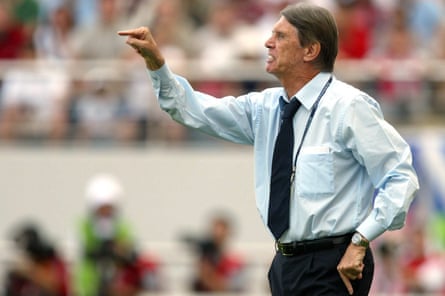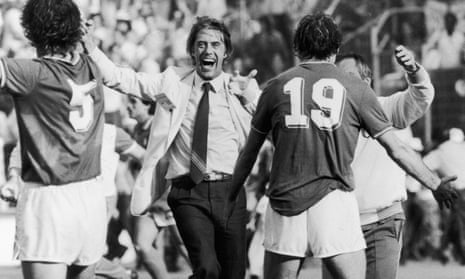To take over the managership of the Azzurri, the Italian national team, at a time of mid-season crisis, at the age of 66, to change its tactics, and to take it to London after a single friendly game, there to beat England at Wembley in a crucial World Cup qualification match in 1997, was a feat in itself. But Cesare Maldini, who has died aged 84, was also the father of one of the best players in that match, Paolo Maldini. The fact that Paolo went on to be a bigger star was consistent with Cesare’s record in encouraging footballing talent.
When the unpopular Arrigo Sacchi resigned as Italy manager midway through the 1996-97 season, Cesare Maldini was the only real candidate to succeed him: other possible names already held club posts at huge salaries. Immediately imposing a highly defensive catenaccio (door-bolt) system on the team, Maldini gambled boldly at Wembley, and won 1-0, a result that helped Italy qualify for the 1998 World Cup.
He used Milan’s “Billy” Costacurta in the unusual role of sweeper, and instructed his stopper, Fabio Cannavaro, to mark the formidable striker Alan Shearer. Though Maldini knew Cannavaro from managing the under-21 side, the young player’s only full international experience had come as a substitute in Maldini’s debut as manager, against Northern Ireland in Palermo. The new England manager, Glenn Hoddle, gambled more recklessly in the Wembley match, and lost.

Italy went out in the quarter-finals the following year in France, and after the tournament Maldini resigned. He remarked sagely afterwards that, with television going everywhere, there were no more secrets in football.
Born in Trieste, Cesare was the son of Albino Maldini, a sailor, who was at sea for long periods, and the boy was brought up by his mother, Maria. He began his professional career at the local club, Triestina, in 1952.
As a player, he was an uncompromising centre-half who would become in time a libero, or sweeper, playing behind the defence – tactics he would bring with him when he took over the Azzurri. In 1954 he joined AC Milan, a team full of famous players, including the elegant Swede Nils Liedholm and the remarkable Uruguayan inside-forward, Juan Schiaffino. He stayed with the club until 1966, and then spent a year with Torino. Selected for the national team, he won the first of his 14 caps for Italy in 1960 and the last in 1963, in a European championship qualifier in Moscow, when Italy were beaten 2-0.
In that year, Milan won the European Cup final at Wembley, against Benfica of Lisbon, making them the first Italian club to win the trophy. A tactical change that secured the match inspired Maldini’s ambition to be a manager. This he did at Milan, becoming assistant manager from 1970 to 1972, then manager until 1974, before leading, in turn, Foggia, Ternana and Parma.
He was assistant coach to Enzo Bearzot when Italy won the World Cup in Spain in 1982, and from 1986 to 1996 he had particular success with Italy’s under-21 team, which responded to him eagerly, delighted, as were the Azzurri when he took charge of them, by his democratic methods. Skilled players were always allowed to express themselves, something for which one of the most skilled of all, Gianfranco Zola, scorer of Italy’s winning goal at Wembley in 1997, declared his gratitude. Though constantly changing personnel, Maldini’s under-21s won the European Under-21 Championship in 1992 and 1994.

By the time of his brief return to Milan in 2001, the team was being captained by Paolo, one of his six children. At the start of 2002, with little Spanish, Cesare beat local candidates to coach Paraguay, a World Cup qualifier, taking them to the last 16 at that year’s finals in Japan and South Korea, where they were knocked out 1-0 by the eventual finalists Germany. From then on, he turned to occasional sports broadcasting.
He is survived by his wife, Marisa (nee Mazzucchelli), whom he married in 1962, and their three sons and three daughters.

Comments (…)
Sign in or create your Guardian account to join the discussion